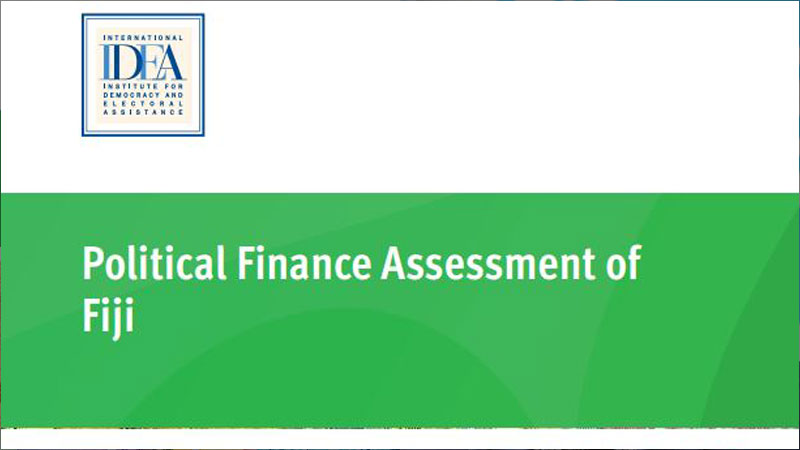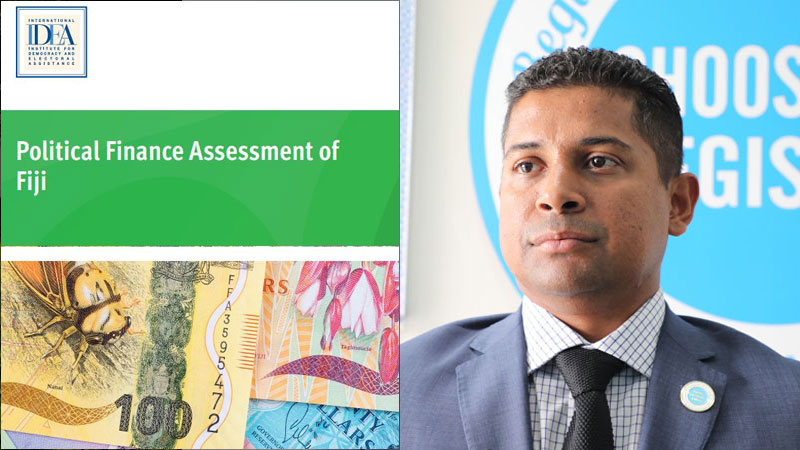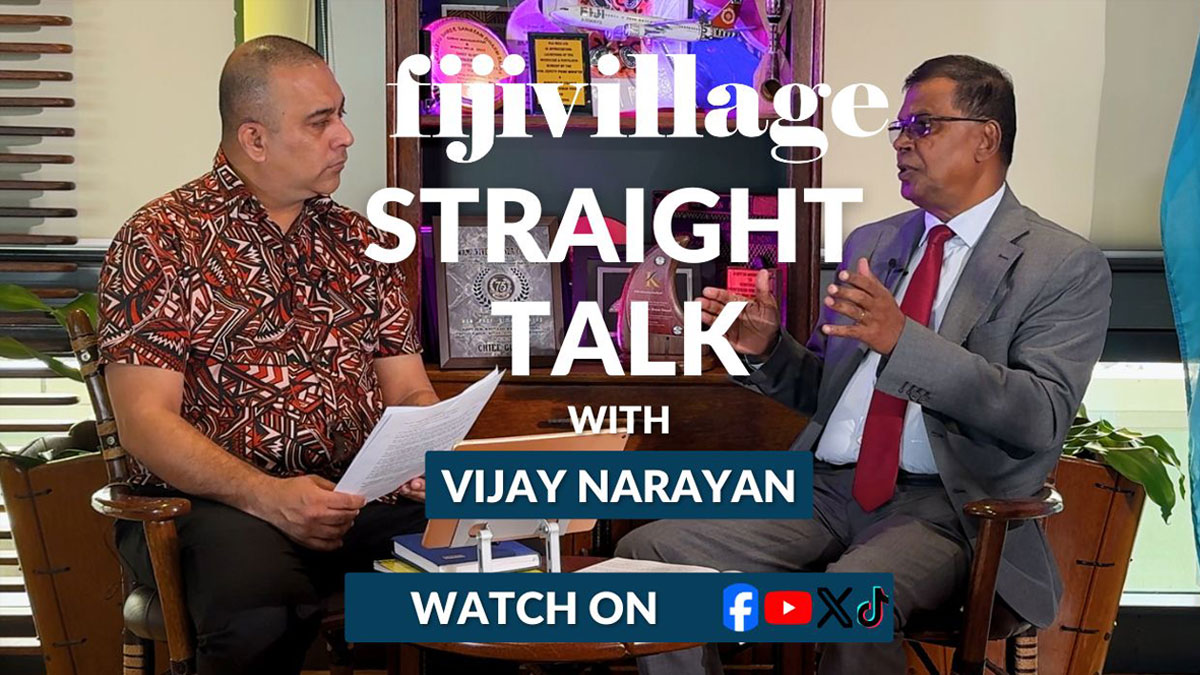
The Political Finance Assessment of Fiji Report published by International IDEA (Institute for Democracy and Electoral Assistance) is recommending Fiji consider allowing corporate donations to political parties up to an appropriate limit as the author says large donations to parties that exceed the contributions cap are being hidden by breaking them down into smaller contributions from family members or employees.
However the Registrar of Political Parties, Mohammed Saneem is asking where is the proof that the companies are doing this.
He also says the report did not pick up about an incident where the donation of a prominent businessperson was highlighted by the Registrar and this was then placed as a fundraiser called Gosh Fulia.
The report says while existing restrictions on funding sources have been partially successful in reducing the scope for undue influence, the evidence seems to suggest that they are constraining the ability of political parties and electoral candidates to amass sufficient financial resources to effectively participate in elections. It says this is evident from the fact that attempts are being made to circumvent these legal restrictions by disguising corporate contributions as individual donations, and hiding large political donations that exceed the contributions cap by breaking them down into smaller contributions from family members or employees.
The International IDEA report recommends a review of the contribution limit for political donations, especially in election year, to make it easier for political parties to acquire sufficient financial resources from a small pool of donors to sustain electioneering activities.
It says this would also eliminate the need for large donors to resort to other means to circumvent the law and have the overall effect of providing a cleaner and more transparent system.
The report further recommends that corporations that receive public contracts, or intend to vie for public contracts in the future, should continue to be banned from making political donations.
It also recommends that there should be a legislative requirement that political donations can only be made by registered voters, to prevent minors from being used by other individuals to make donations to political parties and candidates.
The report says since the promulgation of the Political Parties Act of 2013, the regulation of political finance in Fiji has been subject to a stringent but sound legislative framework.
It says an assessment of the extent to which the regulatory framework has been successful in achieving its intended objectives and outcomes, and the challenges and issues faced in the practical implementation of the regulations, is a valuable exercise in identifying the inadequacies and making recommendations for redress.
The report further says this assessment has identified some areas for reform based on experience and consideration of the Fijian context, its social and political dynamics, and the desired political and electoral objectives.
It says the general conclusion is that, while the regulatory framework is strong and modern in many respects, legal loopholes have been exploited by political interests in a manner that is contrary to the intent and spirit of the law.
According to the 2018 financial disclosures, the FijiFirst received donations amounting to $2.501 million and members registrations totaled $9,522.
Their biggest expenditure was advertising and campaigning in 2018 which totaled $5.455 million.
The FijiFirst had total income of $2.93 million while their total expenditure was $6.311 million.
Their net surplus at the beginning of 2018 was $3.5 million and surplus at the end of 2018 was $169,922.
SODELPA had candidates levy as income in 2018 totaling $260,926, donations $21,177, fundraising $58,344, MPs Levy $37,688, others $56,807 and soli $300,550.
Their total income was $991,111 while the total expenditure for 2018 was $1.01 million.
They had a deficit of $24,760.
The National Federation Party had total donations amounting to $476,230 while their total expenditure was $775,113 in 2018. The total income for the Fiji Labour Party for 2018 was $55,769.
Their total donations was $14,230, levy $30,000, fundraising $11,483 and members subscriptions $39.
Their total expenditure was $47,697.
Unity Fiji had total income of $84,617.
This included candidate fees totaling $45,843, donations $16,228, ticket sales $13,080 and dinner tickets $9,466.
Their total expenditure was $83,222.
By: Vijay Narayan / Shanil Singh

Supervisor of Elections and Registrar of Political Parties, Mohammed Saneem has today announced that the Fijian Elections Office has terminated it’s Memorandum of Understanding with International IDEA (Institute for Democracy and Electoral Assistance) following the publishing of International IDEA’s Political Finance Assessment of Fiji Report.
Saneem says in light of the political nature of various statements in the report and the deficiencies in the International IDEA report, the FEO is taking this step.
He says the organization has not responded to him but he recommends that they should withdraw the report, verify all it’s analysis and results, publish it independently and in a apolitical manner.
Saneem says the report published by International IDEA can be classified as personal opinion by the author and the report is also touching on issues that do not deal with political finance.
The lead author for the Sweden based organisation, International IDEA report was Nilesh Lal who is the Executive Director of Dialogue Fiji.
The Supervisor also says only 26 of the 36 assessment questions were covered, and he also raised the experimental recommendations like allowing companies to make donations to the political parties.
Saneem says it looks like a flip flop proposal.
Saneem says the report has not been compiled in an independent manner but is rather representing various interests of political parties.
He says the commentary that it carries is not on the political finance situation in Fiji but on the perception of political parties.
The Registrar says when a organization attempts to carry out an assessment of various aspects of elections, they must firstly declare their interest.
Saneem adds the methodology in such reports must be crystal clear and in the report the author fails to explain the research mechanisms and the analysis tools he has used.
He says it is unfortunate that this report appears to have over emphasis on the reaction of some political parties and used that as a penultimate source of information.
He says an independent and apolitical research would obtain data from all sources but would verify it before publishing it as its own.
Saneem says another problem with the methodology is that the entire assessment does not outline the framework that has been used.
The Supervisor of Elections says the report purports to represent information published by international political finance experts without even naming them or referring to their publications so another person can verify it.
Saneem also says they dedicated time to respond to the specific questions raised by the author of the report yet none of the responses of the Registrar were incorporated in this assessment.
He adds they analyzed the report against the framework and found that out of the 36 questions, the report only answers 9 questions correctly whereas 4 questions were not answered at all.
We have contacted the lead author, Nilesh Lal.
He has referred all questions to International IDEA.
Fijivillage has sent questions to International IDEA on the report and comments made by Saneem.
Stay tuned for the latest news on our radio stations

